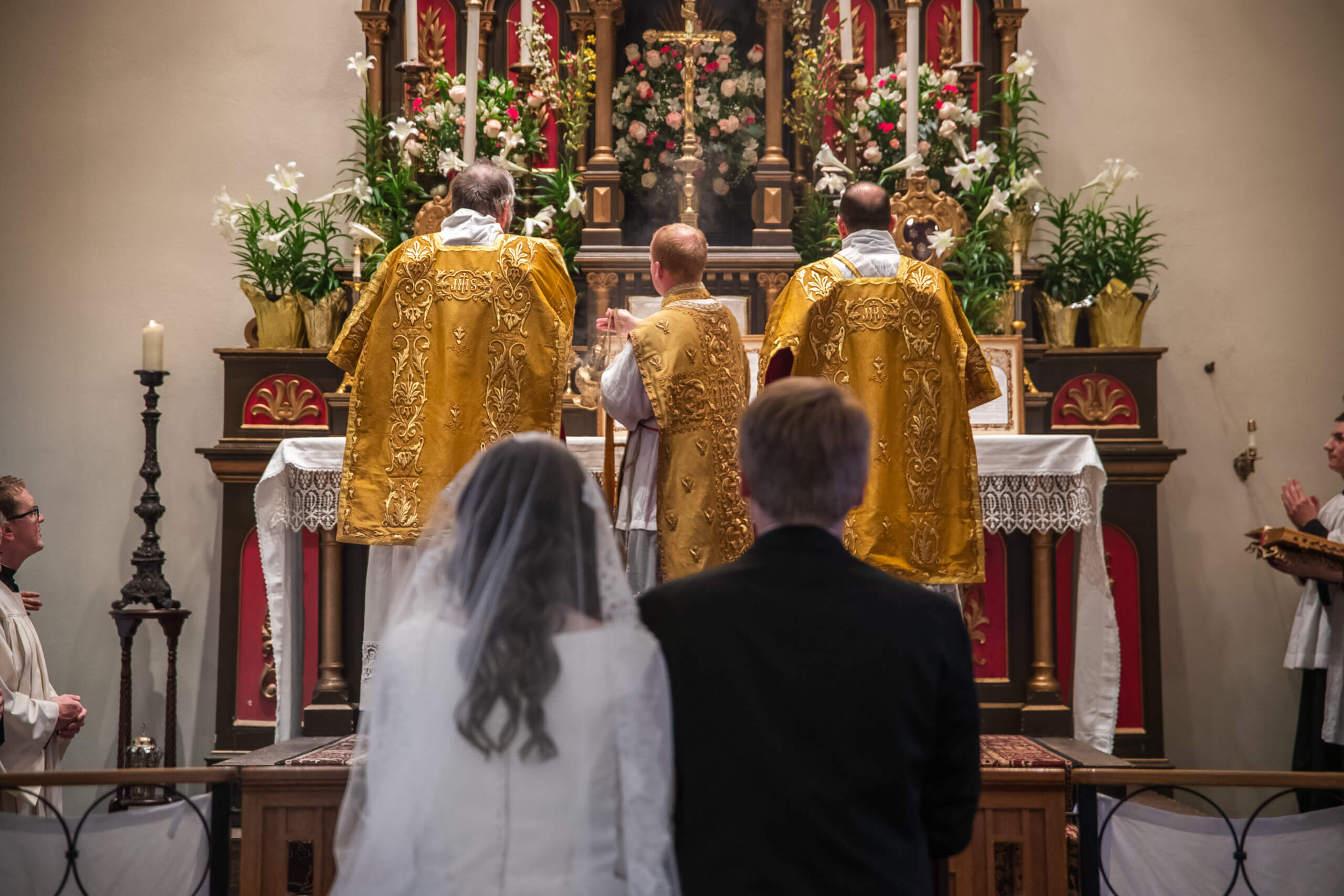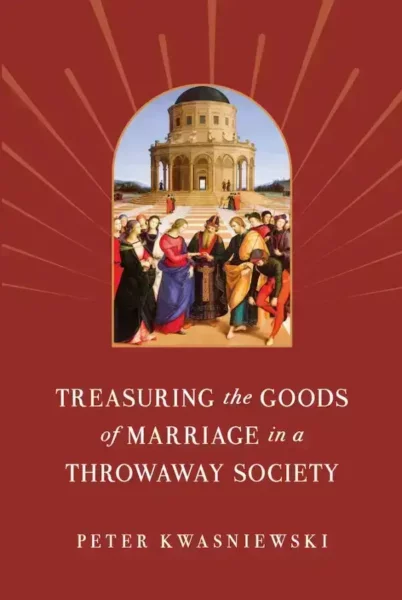I sometimes brag to other Catholics that I know the size of pants worn by the notable Theology of the Body speaker Christopher West. If you’re still reading, allow me to reminisce on simpler times…
I–or a much younger version of myself–am at a Theology of the Body conference in Saskatchewan, Canada. My mom is one of the organizers and I’m supposed to help in any way possible. I am tasked with driving to the airport that Friday evening and picking up the keynote speaker, Christopher West. He is polite and cordial. He doesn’t even seem to mind being picked up in an old Dodge Stratus with scratched bumpers. Though he does chide me for having the music too loud. Whoops.
The next morning is West’s first talk. I watch with amusement. Early on he drops the three-letter “S” word. Don’t ever have a drinking game based on West using the three-letter “S” word at a talk. You will be on the floor within minutes. As if by an irresistible force, every time this word is uttered a dozen or so young men put their arms around the lovely young ladies sitting next to them. It’s awkward. Unlike knowing what size of pants Christopher West wears.
But I must leave this talk early. It’s true, in all the hustle and bustle of travel, he forgot to pack dress pants for the banquet that night. He’s human, after all. I am sent to buy him some pants, as well as breakfast sandwiches. Though I have zero fashion sense, I pick out what I think is a decent-looking pair. Then I panic and buy four large breakfast sandwiches, most of which end up in my stomach. I blast the music with confidence as I drive back to the talks. I am the unsung hero.
The conference carries on. West’s talks are entertaining–he is a gifted speaker–though many of his pop culture references are beyond my knowledge. He speaks mainly on John Paul II’s teachings. In an age of contraception and failed marriages, the large crowd of conservative Catholics appreciates his portrayal of authentic Catholicism. And yes, he speaks frequently on the three-letter “S” word. But it is spoken with reverence and respect. Perhaps too much, I wonder. Those young men must get tired of having their arms around their young ladies. But all goes well. By the end of the conference, Christopher West has won the hearts of these Catholics. I ponder what future Theology of the Body will have within the Catholic Church.
I go home happy, exhausted, and excited. Later that week I ask my captivatingly sweet girlfriend to marry me. She says yes, or at least nods her head a tiny bit up and down. Close enough.
* * *
Fast forward nearly fourteen years. What of these popular marriage talks in the conservative Catholic stream? It’s all a blur. All those points about Theology of the Body, marriage, and the three-letter “S” word… say what? I haven’t even bothered to find out what Christopher West has been up to since then. My mind is occupied with other realities. Which child took my power tools out of the basement? Did we pay our eighth plumbing bill of the year or not? Is it legal to go to bed before the kids? Is it legal to let them eat cereal for supper, every night? In what aisle did I last see my three-year-old at the grocery store? And honey, have you seen where I left my dress pants? I know, I know…what kind of a guy loses dress pants?
There really is nothing that can truly prepare someone for what it takes to live out a marriage. No talk, conference, retreat, university degree, or drug is adequate. I tried all of those –save the drug part. Marriage, this noble institution, is a blur. I’ve blinked and now it is thirteen years later, with kids jumping everywhere, especially where mud, danger, or muddy danger exists. Can anyone else relate?
And yet, I’ve just been recently jolted, unexpectedly, and in a very good way. That is, I have recently finished Dr. Peter Kwasniewski’s latest book, Treasuring the Goods of Marriage in a Throwaway Society. This book quickly became my demand from God to slow down and reevaluate the purpose of this vocation. The results have been shocking for me. This is no pop-Catholic Theology of the Body program with an overemphasis on that three-letter “S” word. Rather, Kwasniewski’s book is an eye-opening explanation, even vindication, of the fullness of marriage from a traditional, dare I say unknown, Catholic perspective.
The book consists of 35 fast-paced and powerful chapters which cover a banquet of salient issues such as marriage, family, chastity, virginity, celibacy, contraception, and abortion. Other topics include modesty, NFP, media, Josephite marriages, community, lust, and love. Kwasniewski permeates each page with a consistent Thomistic understanding of marriage, thus adding an undeniable depth and precision. However, to be clear, this book is void of any numbness-inducing academic ramblings. It is witty, clear, and spiritually uplifting.
Personally, I read this book as a two-part journey. The first consisted of a challenge to my understanding of marriage and the family. By that I mean I had to reconsider everything I ever learned from my former Novus Ordo experiences and studies on marriage, be it with university degrees, books read, or even Christopher West conferences.
What Kwasniewski does is amplify the spiritual dimension of marriage. Take, for instance, the process of husband and wife growing old in marriage. As they age, Kwasniewski notes, they physically decline. Yet this is by God’s design. “The richer and fuller Catholic teaching, implied in St. Thomas and developed by the Church, reveals the continuous lifelong character of Matrimony, from honeymoon to old age and death” (71). A married couple’s dwindling sensible pleasure over time does not damage the significance of Matrimony. On the contrary, this aging is the inherent process toward greater spiritual communion. In old age, the spouses will start to perfectly know and love each other as they come to perfectly know and love God. Call it a proper Theology of the Body and Soul.
With the spiritual end of marriage solidified–again, this was an impactful section for me–I found Kwasniewski’s commentary on the role of marriage in a throwaway society striking. For instance, in chapter 28 Kwasniewski examines the life of an all-too-typical modern woman. Her desire to have as few children as possible (if any), send them to be raised by daycare workers, and then go to work in a stressful occupation away from the home, all to barely afford this “liberated” path, is sad. But when placed within the framework of a heightened understanding of the divine understanding of marriage and family, as Kwasniewski does, it is tragic. “[T]hey are unvirginal celibates, unfruitful wives, uncommitted mothers–and all this by choice” (199). It is sobering. So are Kwasniewski’s chapters on abortion and contraception. He shows, powerfully, just how removed these travesties are from God’s loving design.
Ultimately, this book is one which you can read each evening, and then it occupies your mind all next day until you can get back to reading it again later that evening. More than that, it packs a huge challenging wake-up punch to those who are overwhelmed with life and kids and need to refocus.
Permit me to add a few quick notes:
- Chapter 8 advises on how to elevate the dignity of weddings. This is a must-read chapter for all couples planning their weddings. Highly entertaining yet gets the point across clearly.
- Kwasniewski’s chapters on abortion are hard to read. By that I mean he makes the reality of abortion so apparent–so demonic and frightening–that one is left crying out to heaven for justice.
- There are several touching scenes of profound spiritual writing, such as when he explains applying the sign of the cross to one’s life.
- Many couples will find the NFP section an immense help.
- All in all, this book should be mandatory reading for those wishing to marry, as well as for already-married couples wishing to deepen their understanding of this Sacrament. Indeed, it would make a great foundational text for a university course on marriage.
Exciting new programs, talks, and conferences perhaps fade away. But there is a permanence and beauty to Treasuring the Goods of Marriage in a Throwaway Society. More than this, there is hope in it. A hope founded upon a renewed understanding of how marriage is a profound path towards heaven–suffering and all–for those willing to endure. I read this book and thought: “This is it!”
I challenge all–married, single, or religious–to put on their big boy pants and read this book. It is anything but a throwaway.



